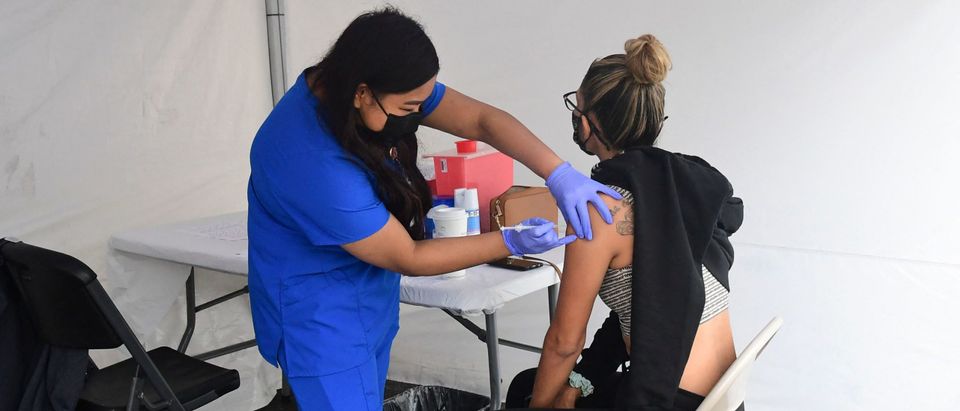Vaccination isn’t the only way to gain some degree of immunity from coronavirus, but just how much protection does someone get from becoming infected with COVID-19?
New scientific research suggests that people who recover from a COVID-19 infection are highly unlikely to be reinfected, at least for some period of time. There’s still reason to get a vaccine though, regardless of whether or not someone has already had the virus.
A study published in The Lancet in March found that previous infection with COVID-19 offers high protection against re-infection for most of the population, but not with individuals over 65 years of age.
The study examined testing data from roughly 4 million individuals who took more than 10 million COVID-19 tests in Denmark, and found that prior infection gives an individual about 80% protection from getting the virus again. Only 0.6% of the individuals studied became reinfected after an initial bout with the illness.
There wasn’t evidence that the protection grew weaker over time, although the study is limited in long-term findings due to the pandemic only being widespread for around one year. However, individuals over age 65 only had about 47% protection against reinfection, far lower than the general population.
Since those older individuals are also at highest risk of serious or fatal cases of COVID-19, the authors suggest that they should still be prioritized for earlier vaccination even if they have already been infected with the virus.
#VaxFact: You should still get a #COVID19 vaccine even if you’ve already had COVID-19.
Experts don’t know how long you’re protected from COVID-19 after you recover.
More vaccine facts: https://t.co/c3T9VAF5Ce. pic.twitter.com/xFGU6l1CuV
— CDC (@CDCgov) March 24, 2021
Other researchers have presented similar findings. One study from Qatar found that recovered patients may have up to 95% protection against re-infection for some period of time. Earlier studies of related SARS and MERS viruses have found between two and three years of natural immunity in individuals who recover from those infections.
The role that variants play in immunity is not entirely clear. The virus is constantly evolving and long-term research has not been conducted on every variant currently spreading. (RELATED: The CDC Says COVID-19 Cases Are Rising, But That Isn’t The Whole Story)
Some experts warn that natural immunity may not stand up as well against different forms of the virus. “Since these variants are new viruses that require a different kind of immunity, the old immunity may not be as effective,” Dr. Helmut Albrecht told WIS News 10.
University of Michigan epidemiologist Aubree Gordon agreed. “My guess is that a lot of people who have previously had SARS-CoV-2 are probably still protected in part, or not as protected [from variants],” she told Science News.
Vaccine trials conducted thus far have all indicated that Pfizer, Moderna and Johnson & Johnson’s vaccines remain effective against known variants of COVID-19, although effectiveness may be weaker against certain strains.
One study of concern from Brazil indicates that it may not be the case that natural immunity always holds up against variants. In Manaus, Brazil, a second wave of infections emerged after the spread of a new variant despite roughly three-quarters of the population there having already been infected.
In addition to variants, false positive tests are another reason to get vaccinated even after previously being infected with the virus. There’s a small but non-zero chance of testing positive for COVID-19 even without being infected, and the risk is higher with rapid tests and asymptomatic cases, according to the CDC. For that reason, some individuals may assume they have built a level of natural immunity when they actually haven’t.
At this point, most research and expert opinion points to vaccination being a more reliable way to ward off the virus than natural immunity. “Natural infection doesn’t guarantee you immunity as well as perhaps the vaccination might,” said professor of immunology at the University of Surrey Deborah Dunn-Walters to The Guardian.
It is currently unknown exactly how long natural immunity may last for, and the potential side effects of getting a vaccine are generally far less serious than the health risks of contracting COVID-19, particularly for the elderly. For those reasons, the CDC recommends Americans still get vaccinated, even if they’ve tested positive for coronavirus in the past. (RELATED: ‘You Parade Around In Two Masks For Show’: Sen. Rand Paul Questions Dr. Fauci On Wearing Masks After Vaccination)
Perhaps most critically, some experts have said more vaccinations will slow down mutation of the virus. Pathogens mutate and develop into new variants by passing through a number of hosts. As a result, individuals relying on natural immunity could still be helping new variants of the virus develop, while vaccinated individuals who do not get infected at all will slow that process.


